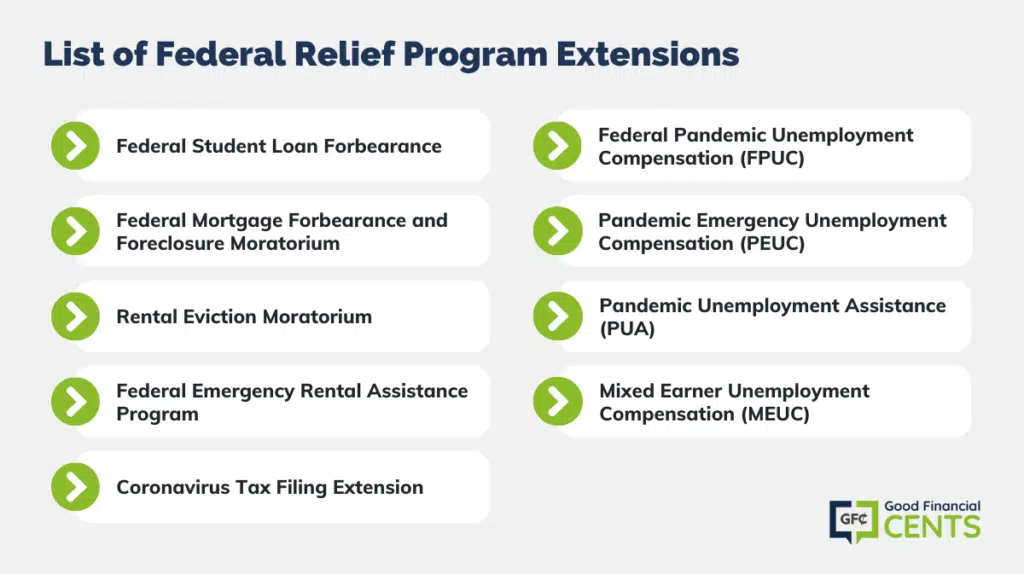In the midst of economic ebb and flow, federal relief programs stand out as beacons of support for those weathering the tides of change. The ongoing commitment of these programs in 2024 signals a robust safety net for individuals and families grappling with financial hurdles.
Table of Contents
- Financial Assistance for Individuals and Families
- Housing Assistance Programs for Renters
- Housing Assistance Programs for Home Buyers
- Food Assistance Programs
- Healthcare Programs
- Retirement Programs
- Tax Filing Assistance Programs
- Financial Assistance Programs for Small Businesses
- The Bottom Line – Your Ultimate List of Federal Relief Program Extensions for 2024
Financial Assistance for Individuals and Families
As the fabric of our economy faces strain, federal relief programs provide the necessary reinforcement to prevent tears in our social safety net.
These initiatives are not mere handouts but investments in the collective well-being of our society, ensuring that temporary setbacks don’t lead to permanent scars.
Unemployment Insurance
The thread of economic recovery is interwoven with the stability that unemployment insurance provides. Its extensions are more than a lifeline; they represent a commitment to preserving the dignity of work by supporting those in between jobs.
It’s not just about financial aid; it’s about maintaining the workforce’s readiness to return to the labor market fully equipped. The expanded reach of unemployment insurance acknowledges that job loss can occur to anyone.
The modifications made cater to a broader spectrum of the workforce, recognizing the varying needs from industry to industry and reflecting the government’s responsiveness to an evolving job landscape.
Temporary Assistance for Needy Families (TANF)
TANF‘s extended hand is reshaping the landscape of federal assistance.
By updating eligibility and benefits, it’s redefining what social safety nets can look like — responsive, dynamic, and attuned to the diverse needs of American families. It’s a program that not only meets immediate needs but also empowers families toward self-sufficiency.
This expansion is particularly crucial in light of economic pressures. By refining TANF, the government underscores its understanding that aid is not just a monetary transaction but a bridge to greater stability for families facing the harsh realities of poverty.
Social Security Disability Insurance (SSDI) Benefits
SSDI benefits, now more than ever, offer a cushion against the unforeseen challenges brought on by disabilities. The adjustments made to the program are testimonies to a society that values its members’ ability to live with dignity, regardless of the physical challenges they face.
With each extension, SSDI adapts to the changing needs of its beneficiaries, ensuring that assistance remains relevant and sufficient in the face of rising costs of living and healthcare. It’s a clear signal that the well-being of individuals with disabilities remains a priority.
Supplemental Security Income (SSI)
SSI extensions reflect a compassionate and practical approach to assistance. The program acknowledges the nuanced challenges that come with disabilities and the economic variances that affect individuals’ lives.
In this vein, SSI remains a pivotal program, adapting to ensure that its support is not eroded by inflation or changes in the cost of living. The program’s commitment to flexibility ensures it remains a reliable pillar for those who depend on it.
Student Financial Aid
Continued support through student financial aid is an investment in the nation’s future. The extensions and modifications to these programs signal an understanding that education is paramount and must be safeguarded, particularly for those from disadvantaged backgrounds.
The recent changes address not only tuition but also living expenses, books, and other education-related costs, recognizing the full spectrum of financial barriers that students face. This comprehensive approach ensures that education remains accessible and equitable.
Affordable Connectivity Program (ACP)
The ACP‘s extensions acknowledge the role of digital access in leveling the playing field in education, job search, and staying informed. As the program continues to evolve, it actively bridges the digital divide, ensuring that all Americans can partake in the digital revolution.
This program is now a critical component of the national infrastructure, as vital as any utility. Ensuring its reach and adequacy means embracing the reality that connectivity is a modern-day necessity, not a luxury.
Housing Assistance Programs for Renters
Housing stability remains a cornerstone of individual and communal prosperity. By extending housing assistance programs, the federal government recognizes the foundational role of a stable home in the pursuit of a productive and fulfilling life.
Extension of Rental Assistance Programs
The extended tapestry of rental assistance programs weaves a stronger social safety net, providing peace of mind for renters across the nation.
The extensions are a testament to a nation that values the security of its citizens and understands the ripple effect that housing stability has on all aspects of life.
By ensuring that these programs are robust and responsive, the government is not just preventing homelessness; it’s fostering the conditions for thriving communities.
Housing assistance is about laying the groundwork for individuals to build upon toward greater economic and personal achievements.
How to Apply and Qualify for Assistance
The process for applying and qualifying for rental assistance has been simplified, a move that translates into more families being able to secure the housing they need without undue complexity.
This is about access and equity; it’s about ensuring that support reaches those who need it most without a labyrinthine process.
The government’s streamlined application processes for housing assistance show a commitment to removing barriers to aid. Simplifying the qualification criteria does not diminish the rigor of the programs; instead, it amplifies their effectiveness by making them more inclusive.
Housing Assistance Programs for Home Buyers
Owning a home is woven into the American dream, and the federal government’s housing assistance programs for home buyers help turn that dream into reality for many. The support these programs offer is critical in fostering homeownership and the financial stability it can bring.
Federal Housing Administration (FHA) Loans
FHA loans are a testament to the government’s role in making homeownership accessible. The recent enhancements to FHA loans demonstrate a keen awareness of housing market dynamics and a commitment to adapting to the needs of prospective homeowners.
These loans are not just financial products; they are tools of economic empowerment. They represent a pathway to homeownership for those who might otherwise find it out of reach, affirming the belief that homeownership should be accessible to all, not just a privileged few.
Homeownership Vouchers
Homeownership vouchers are a potent tool in the government’s arsenal to promote economic diversity and stability.
By extending these vouchers, the government continues to back the aspiration of homeownership for low-income families, acknowledging that secure housing is a critical stepping-stone to economic independence.
The vouchers do more than just assist with the purchase of a home; they’re a symbol of the government’s recognition of the inherent value that comes with owning a home — the sense of permanence, belonging, and investment in one’s community.
Support for Active-Duty Service Members and Veterans
Special housing assistance for active-duty service members and veterans honors their service by ensuring they have access to one of life’s fundamental needs — shelter.
The continuance and enhancement of these programs express a clear message of gratitude and support for those who have sacrificed for their country.
The targeted support recognizes the unique circumstances of military life and veterans’ service, offering tailored assistance that acknowledges their contributions while also addressing their specific housing needs.
State-Specific Housing Assistance Programs
The extension of state-specific housing assistance programs reflects an understanding that housing markets vary dramatically across the nation.
These programs address the diverse challenges of home buying, from rural to urban settings, ensuring that assistance is not a one-size-fits-all but a tailored fit to individual state needs.
State programs act as crucial complements to federal efforts, ensuring that the nuances of local housing challenges are met with precise and effective solutions. This partnership between federal and state initiatives is essential for a comprehensive approach to housing assistance.
Food Assistance Programs
Food is a fundamental human need, and the federal government’s commitment to ensuring that no citizen goes hungry is manifest in the range of food assistance programs available. These programs are about more than sustenance; they’re about nurturing the nation’s health and future.
Initiatives to Combat Food Insecurity
The government’s initiatives to combat food insecurity tackle a critical issue head-on. By extending these programs, there’s an acknowledgment that access to nutritious food is a right, not a privilege, and a necessary foundation for a healthy life.
These initiatives are multi-faceted, reaching into schools, homes, and communities, ensuring that the battle against hunger is fought on all fronts. It’s a comprehensive approach that recognizes the complex nature of food insecurity and the multifarious strategies required to address it.
Supplemental Nutrition Assistance Program (SNAP)
SNAP’s continued support is an acknowledgment of the program’s effectiveness and its essential role in the fight against hunger. The recent extensions ensure that SNAP can continue to respond to the needs of those it serves, adapting to economic shifts and societal changes.
The program’s responsiveness to inflation and the cost of living helps maintain its relevance and ensures that its benefits are not diluted over time. SNAP isn’t just about feeding the hungry; it’s about nourishing communities.
Special Supplemental Nutrition Program for Women, Infants, and Children (WIC)
WIC’s targeted support for mothers and children is not just a health program; it’s an investment in the nation’s future. By extending WIC, the government underscores its commitment to the health and development of the next generation.
The program recognizes the specific nutritional needs of women, infants, and children, offering support that’s as much about education as it is about assistance. WIC’s extensions are not merely procedural; they’re a reflection of an ongoing commitment to public health and early development.
School-Age Children Food Programs
The continuation of school-age children’s food programs affirms the principle that no child should face hunger. These programs provide not just meals but also a sense of normalcy and security, allowing children to focus on learning rather than where their next meal will come from.
By guaranteeing nutritional support within the educational system, these extensions demonstrate an understanding that health and education are interlinked.
When children are well-fed, they are better learners, and these programs are crucial in fostering an environment where every child can succeed.
Food Programs for Seniors
The extended food programs for seniors address the nutritional needs of an aging population, recognizing that seniors have contributed to society and deserve to retire with dignity, which includes access to adequate food.
These programs are a statement of respect, ensuring that seniors aren’t left behind in the pursuit of health and well-being. With these extensions, the government acknowledges that seniors may face unique challenges in obtaining nutritious food, including mobility limitations and fixed incomes.
By bolstering these food programs, the government helps safeguard the quality of life for older adults, allowing them to maintain independence and health for as long as possible.
Healthcare Programs
Healthcare remains one of the most crucial sectors influenced by federal programs. The recent extensions of healthcare initiatives reflect an understanding of healthcare’s vital role in individual and national well-being.
Medicare and ACA Marketplace Extensions
Medicare and ACA marketplace extensions are a reflection of the evolving healthcare needs of the nation. These extensions not only provide continuity of care for millions but also reflect a commitment to adapting to the changing healthcare landscape.
The enhancements to Medicare and the ACA marketplace ensure that the elderly and those without employer-sponsored insurance have continued access to affordable healthcare.
This is critical not only for the management of ongoing health conditions but also for the nation’s overall health resilience.
Medicaid and CHIP Extensions
Medicaid and CHIP play vital roles in providing healthcare to the most vulnerable populations, including low-income families and children.
Extending these programs demonstrates a commitment to ensuring that these groups are not overlooked and that healthcare remains accessible regardless of economic status.
The extensions of Medicaid and CHIP are crucial for the health of millions, serving as a safety net for those who find themselves in financial distress.
They also play a pivotal role in early childhood development, ensuring that the next generation has the healthcare foundation they need to thrive.
Veterans Administration Healthcare
The extension of Veterans Administration healthcare programs underscores the nation’s pledge to care for those who have served. These programs are essential in addressing the unique health challenges that veterans may face, including service-related injuries and mental health issues.
By continuing to support Veterans Administration healthcare, the government honors its commitment to veterans, providing them with the specialized care they need and deserve.
It’s a gesture of gratitude and an essential component of the covenant between the nation and those who defend it.
COBRA Continuation Coverage
The extensions of COBRA continuation coverage ensure that individuals who lose their jobs don’t have to face the added anxiety of losing their health coverage. This is particularly significant in times of economic uncertainty when job security is less assured.
COBRA’s extension provides a crucial buffer during employment transitions, allowing individuals and families to maintain their healthcare coverage as they navigate changes in their professional lives.
It is an acknowledgment of the stress associated with job loss and a bid to mitigate its impact on health and well-being.
State Health Department Program Extensions
State Health Department programs often fill the gaps left by national initiatives, addressing specific health concerns within individual states. Their extensions ensure that these localized needs continue to be met with the nuance and specificity required.
By supporting these programs, the government ensures a cohesive health system that can respond to diverse health landscapes.
Retirement Programs
Retirement programs stand as pillars of the promise that a lifetime of work will be rewarded with security in one’s later years. The extensions of these programs reaffirm the value placed on this stage of life.
Social Security Retirement Benefits Updates
Social Security retirement benefits are a fundamental component of American retirement planning. The updates to these benefits reflect an understanding of the financial challenges that retirees face, ensuring that Social Security keeps pace with the times.
The extensions and updates to Social Security retirement benefits are not just administrative adjustments; they’re an acknowledgment of the ever-changing economic environment retirees face, ensuring that benefits remain sufficient and relevant.
Federal Employees Retirement System (FERS) Changes
Changes to the Federal Employees Retirement System (FERS) demonstrate a recognition of the unique retirement needs of federal employees.
These adjustments ensure that those who have spent their careers serving the public continue to have a retirement system that adequately reflects their contributions.
The enhancements to FERS are about fairness and respect for public service, aligning retirement benefits with the realities of the cost of living and longevity. It’s a commitment to those who have dedicated their careers to the nation’s service.
Tax Filing Assistance Programs
Tax filing can be a complex process, and assistance programs play a crucial role in helping citizens navigate their tax obligations. The extensions of these programs show an understanding of this complexity and a desire to provide support.
Free File Program Extensions
The Free File program extensions ensure that this valuable service remains available to those who need it. By providing free access to tax filing software, the program helps to level the playing field, allowing all taxpayers, regardless of income, to file their taxes efficiently and accurately.
These extensions represent more than just a convenience; they are about empowering taxpayers through access to tools that can simplify the tax filing process, reducing the burden and stress associated with it.
VITA and TCE Tax Filing Assistance Updates
The updates to VITA (Volunteer Income Tax Assistance) and TCE (Tax Counseling for the Elderly) programs show a commitment to providing targeted tax assistance to those who need it most — low-to-moderate-income individuals and the elderly.
These programs not only assist with tax filing but also provide education on tax benefits and credits, ensuring that eligible taxpayers are able to fully leverage tax advantages. The continued support for VITA and TCE is a testament to the government’s dedication to equitable tax support services.
Financial Assistance Programs for Small Businesses
Small businesses are often referred to as the backbone of the economy. The federal government’s extensions of financial assistance programs for these entities underscore the importance of supporting the entrepreneurial spirit that drives economic growth.
USDA Program Enhancements
The USDA’s program enhancements are particularly crucial for small businesses within the agricultural sector. These updates ensure that farmers and rural businesses have access to the necessary financial resources to thrive and adapt to market conditions.
These enhancements go beyond mere financial aid; they represent a strategic investment in the sectors of the economy that are often most vulnerable to volatility and change, bolstering the entire agricultural supply chain.
Small Business Lending Fund Updates
The Small Business Lending Fund is essential for providing small businesses with the capital they need to expand and create jobs. The updates to this fund demonstrate an understanding of the evolving needs of small businesses and the economic landscapes in which they operate.
By refining the Small Business Lending Fund, the government reinforces its commitment to fostering an environment where small businesses can continue to innovate and drive economic progress.
The Bottom Line – Your Ultimate List of Federal Relief Program Extensions for 2024
Staying abreast of changes in federal relief programs is more than just a bureaucratic necessity; it’s about understanding the lifelines available that can provide stability and support through challenging times.
The extensions and enhancements of these programs reflect a government responsive to its people’s needs, dedicated to fostering a society where opportunities for health, well-being, and economic stability are within reach for all.
The encouragement to apply for these programs is not just about the potential financial support; it’s about being part of a larger community that cares and provides for its members.
As these programs continue to evolve, they offer a reflection of a government working to serve and uplift its citizens, ensuring that the promise of support is not just an empty one but a substantial commitment to the American people.








